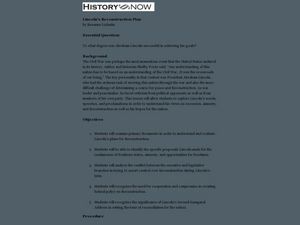Curated OER
Lincoln and His Generals
Students explore Abraham Lincoln's role as Commander in Chief. In this American Civil War lesson, students listen to an instructor-delivered lecture on Lincoln's leadership and then analyze 8 pirmary documents to determine what Lincoln's...
Curated OER
Lincoln's Spot Resolutions
Students take a closer look at historical relations between the United States and Mexico. In this Texas annexation lesson, students examine primary documents authored by Zachary Taylor, James Polk, and Abraham Lincoln to consider why the...
Curated OER
Lincoln's Reconstruction Plan
Students explore Lincoln's Reconstruction plan. For this Reconstruction lesson, students examine Lincoln's speeches and writings on bringing the country back together following the war.
Curated OER
Lincoln, Emancipation, and the Constitution
Students determine how President Lincoln promoted emancipation. In this slavery lesson, students examine primary documents, including the U.S. Constitution, to reconstruct Lincoln's attempts to end slavery and deliver the Emancipation...
Curated OER
Abraham Lincoln on the American Union: " A Word Fitly Spoken"
Young scholars consider Lincoln's perspective. In this presidential perspectives activity, students explore the political thoughts of Lincoln through a series of lessons that make use of primary source analysis. They hypothesize and take...
Civil War Trust
Gettysburg Address
The Gettysburg Address may have been four score and seven years ago, but its message is still as relevant today. Young historians explore the context of the famous speech, as well as its central theme and argument, before discussing the...
Curated OER
The Gettysburg Address (1863): Defining the American Union
Students explore the Gettysburg Address. In this U. S. history lesson, students examine Abraham Lincoln's speech and it's themes of freedom, equality, and emancipation.
Curated OER
Drafting the Gettysburg Address
Students, in groups, compare and contrast Abraham Lincoln's drafts and final version of the Gettysburg Address. They explain the differences between the final version and drafts of the Gettysburg Address.
K20 LEARN
The Power of Poetry: Perspectives in Poetry
What do Abraham Lincoln, Dr. Martin Luther King, Jr., and Amanda Gordon have in common? They all believe in the power of words—the power of words to create change. After analyzing the rhetorical strategies in several poems and speeches,...
Curated OER
The Gettysburg Address by Abraham Lincoln
"The Gettysburg Address" is the basis of a series of activities that not only model for learners how to conduct a close reading of a text, but also how a close reading can help them comprehend a difficult text. The detailed, step-by-step...
Curated OER
What This Cruel War Was Over: Slavery and the Civil War
Can't travel to Richmond for your Civil War unit? This plan creates an authentic experience, using primary sources and the essential question: Over What Was the Civil War Fought? Historians examine the Appomattox Marker, the site of Gen....
Curated OER
Lincoln is in the House! ("Name-Dropping" Poems and the Power of Connotation)
“What’s in a name?” Just about everything. Barack Obama, Vincent van Gogh, Justin Bieber. Famous names evoke a multitude of reactions and poets often use the names of famous people in their works precisely because names carry...
Classroom Law Project
How do we hire a President?
What are the job requirements for the office of president of the United States? What attributes should a candidate possess? Are the qualities needed to govern the same as those needed to win? What can an analysis of the management style...
Classroom Law Project
Should we believe everything we read? Becoming a discerning consumer of media
Class members investigate the role media should play in a healthy democracy. As part of this study, groups analyze political advertising, use FactCheck to assess not only the veracity of but the persuasions techniques used in candidates'...
Appalachian State University
Glory: Motion Picture Study Guide
This is an excellent resource for teachers to use for incorporating the motion picture Glory into the classroom! Breaking down the film into particular noteworthy and telling scenes, the guide offers important considerations for each...
National First Ladies' Library
The President's Assassin: Motives and Outcomes
Students investigate the assassinations of four American presidents. Through research, groups create a dossier on one of the four men who were the assassins. After presentations of the dossiers, the class looks for common traits in...
Curated OER
Arthur Young and the President
Young scholars work with NASS data by converting it into prose. In this historical agriculture information instructional activity, students read about how George Washington communicated information about crop yields, livestock, and land...
Curated OER
Andrew Jackson and the Use of Martial Law and the Suspension of Habeas Corpus
Students explore the use of martial law at the Battle of New Orleans. In this Andrew Jackson lesson plan, students analyze primary documents pertaining to the move by Jackson to use martial law in the battle. Students then consider...



















